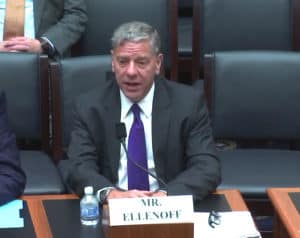The US Securities and Exchange Commission (SEC) is watching.
It likely will not be long before the first enforcement action against a Non-Fungible Token (NFT) issuer is announced. The 80+ enforcement actions the regulators have taken to date on cryptocurrency, digital assets, and Initial Coin Offerings (ICO) “only stand to prove the point.”
As noted in an update, the story is familiar: XYZ issuer “peddles a digital asset, investors buy it with an eye on return, investors may or may not lose some or all their investment, regulators storm in, and facts and circumstances drive the path of their enforcement action.” Punishment may be “as painful as rescission and loss of license or as severe as jail time.” Either way, the legal expense, and reputational risk are “significant.”
 Doug Ellenoff, Partner at Ellenoff Grossman & Schole, LLP, stated
Doug Ellenoff, Partner at Ellenoff Grossman & Schole, LLP, stated
“The variety of use cases for NFTs, combined with rapid and significant growth in the number of offerings, and in some cases the promise of a large potential upside for investors, have made NFTs increasingly popular. This increased interest from the public at large, especially from would-be investors, could very likely be followed by increased scrutiny from regulators.”
According to DappRadar, NFT sales volume scaled to $24.9 billion in 2021, “compared to just $94.9 million in 2020.”
With such steady growth, it should be “no surprise that SEC Chair Gary Gensler recently said at an Investor Advisory Committee hearing, “… this is an asset class that belongs inside public policy frameworks of looking after investors, guarding against the illicit activity, and protecting our financial stability.”
While discussing the broader token marketplace, NFTs are “part of this by default.”
Ellenoff continued:
“We believe that many, not all NFTs, like ICOs, will be deemed to be securities, and therefore, a compliant means of satisfying both Federal and State securities laws is required. This means instead of acting outside securities laws; one finds a way to do it within them.”
Luckily such a roadmap actualy exists. It reportedly “consists of creating an NFT, securitizing it, qualifying it via an exemption from registration with the Securities and Exchange Commission, issuing it on the blockchain, meeting secondary trading compliance requirements, then listing it on an Alternative Trading System (or a public stock exchange if you like).”
Dalmore Group, a broker-dealer, specializing in helping firms secure capital online and having over 150 Regulation A+ issuers under its belt, is one player “focused on this solution.”
Etan Butler, Chairman of Dalmore Group, noted
“NFT issuers have a choice; they can either go at it alone with all of the regulatory and enforcement risks inherent in a developing marketplace selling unregistered securities. The other option for NFT issuers is to choose a more conservative and relatively cost-effective approach to vehicles like Regulation A+. In today’s market, the choice really should be easy.”
GUARDD is a tech solution provider that “allows issuers to comply with their state Blue Sky requirements.”
With GUARDD, an issuer offers current and ongoing company and financial disclosures that are released in a National Securities Manual, “qualifying for what is known as the Manual Exemption.”
Sherwood Neiss, CEO of GUARDD, added:
“By using GUARDD to file disclosures, NFT issuers can qualify for exemption from registration in almost every state. We also help our clients with the last mile: what they need to do to be compliant in the remaining states so that their NFTs can trade anywhere in the USA.”
For more details on this update, check here.

